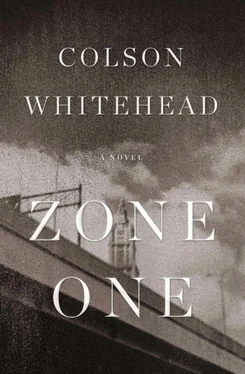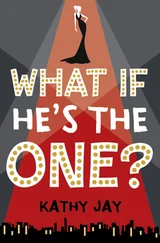Mark Spitz cradled this memory of their last celebration as he entered Wonton’s corona. It had been a lovely night, that time they tried to kid one another that the world was not ending. Listening to the gunfire from uptown, he knew what was happening. The barrier was about to fail. It was falling down, as it always did.
It started like this: On White Street he flagged down Lester, one of the Alpha Unit guys and self-appointed party wrangler for Sunday R & R ever since their first week in the Zone. Lester carried a case of Long Island red, and a huge plastic bag of popcorn dangled from the fingers of his left hand. He nodded toward the wall, rolling his eyes at the barrage, as if vexed by the neighbor’s leaf blower during his annual barbecue. “Skels been coming for dinner all day, nonstop.” Had Mark Spitz heard about the Lieutenant? Yes, he had. Lester was scrounging supplies for the next wake, bound for the dumpling house.
Mark Spitz told him he’d see them there, declining to tell him about Gary’s bite, per his friend’s wishes. Plus, Gary hated Lester.
It never ceased to be an odd sight, the approach to Wonton at night. The unnatural glare of the op lights bleached the buildings bone-white as the shadows gathered the potsherds of the dead world. This night he noticed the dead bargains: the handwritten EVERYTHING MUST GO sign in the second-floor window of a shop of no decipherable purpose, a banner proclaiming the specialty sandwich at the fast-food chain. At the corner of Broadway and Canal, the scale of the engagement shocked him. The anxious overture of the previous afternoon had evolved into a lush, neurotic symphony. The machine guns fired without cessation. He’d become so accustomed to the gunfire, the steady escalation of its bluster, that he hadn’t considered how many men and women such an onslaught entailed. In the lairs atop the key structures overlooking the wall, twice as many snipers trained their scopes, muzzles crackling next to the squatting cornice gargoyles and the shells hopping on the rooftop tar. On the catwalk girding the human side of the wall, the troops were doubled up as well, strafing, reloading, zeroing in on a new target cluster up the avenue that was hidden from view by the wall, and then on to the next.
He couldn’t see what the soldiers aimed at, but he could smell it. From the magnitude of the stench, the bodies putrefied in vast dunes on the other side of the barrier. West, toward the incinerators, the stack vented its puff of smoke and ash, but the fuel must have been sweeper deliveries, as Wonton had ceased scooping corpses from beyond the wall. The grab-crane duo, drenched in the rank fluids of the dead, were motionless, gigantic praying mantises caught in an inscrutable pose. Perhaps they hadn’t repaired the machines yet or had diverted those on crane detail to the perimeter to knock down skels. Yesterday’s pools of blood and gore had expanded into lakes fed by the mass of leaking corpses.
The vicinity of the wall bristled and bucked with activity, but a few feet away, beyond the combat lines, the Sunday-evening routines puttered as usual, inconceivably: Engineers strolled in an insouciant haze as they planned the evening’s diversions, poker or a movie in one of the rec spaces; couples snuck off to their rendezvous before the new workweek implicated them; the guys and gals from the other sweeper teams waved at him to hurry up and join them at the dumpling house. After all this time in the abattoir, the survivors were completely inured to the agenda of catastrophe.
They didn’t feel what he felt. Mark Spitz relished the cadence in his veins, the way his senses had ticked up into a state of uncanny alert. The rusty wasteland systems were powered up, the algorithms sorting input. As the door of the bank closed behind him, the muffling of the guns underscored the ferocious disposition of the street. HQ was tranquil, even for a Sunday night. Was the regular army on an op right now? No time to guess: He had a mission. The second-floor hall, so hectic as it channeled Buffalo’s whims toward actuality, was empty now.
The Lieutenant’s—correction—Fabio’s office was locked. Mark Spitz rattled the door. Two cartons were stacked at his feet, the top one sliced open. He picked up one of the items inside: a combat helmet, the back of which had been branded with a butched-up drawing of the famous kid-show armadillo. The varmint made a muscle, bicep curving formidably, as he chomped a cigar butt between square white teeth. A cigar in this day and age, smoked by a kiddie icon: somebody was going to get fired. Mark Spitz had to give respect to reconstruction’s new mascot, who was more prepared for what was coming than anyone at Wonton. Except for him.
Fabio let Mark Spitz in, tentatively, chary of the sweeper’s bad news, whatever its stripe. When Mark Spitz briefed him, Fabio mumbled a curse and his glance drifted to the windows overlooking the wall. The man was in a fog. He said, “Gonna have to fill out a special T-12 casualty form. I think I have one somewhere.” He hassled the top drawer of his desk, perplexed, fiddled in his pockets for keys.
Mark Spitz yanked the man forward by his shirt. He laid out the situation in more emphatic terms.
Fabio looked into Mark Spitz’s face, only recognizing him in that moment. He apologized. “I thought you said it was a straggler.”
“What we thought.”
“That doesn’t sound good.”
“It’s not,” Mark Spitz said. Fabio wasn’t partial to original thinking, but yes, Gary’s Gypsy curse was a problem. This mutiny broke the rules. If one skel broke the rules, there were more. It was survivor’s logic: If Mark Spitz was alive, there had to be others. Until the day it was not true. The fortune-teller must be a mistake, an errant bad comet loping into their solar system, the malfunctioning one percent of the malfunctioning one percent. Or else the world was resuming its decomp after these months of tenuous integrity, those stalwart membranes and harassed cell walls finally dissolving into a black spume.
“Where’s Tammy?” Mark Spitz said. “He’ll need morphine.”
“You think he has the time for that?” Fabio stared, blank as a midtown sidewalk. He said, “However you want to handle it. You can have access to her meds, but Tammy’s on a chopper to Happy Acres.”
Mark Spitz asked why.
“We lost contact three hours ago. Sent some army guys to check it out.”
“What is it?”
“The last transmission was hard to decipher.”
“What Fabio is trying to say is that we’ve lost contact with everyone.” It was Bozeman, his puffy round face harassed by worry. He had ditched his clerk’s khakis for full combat gear, and Mark Spitz was surprised to see the RPG launcher slung over the man’s back.
“It’s the comms,” Fabio said. “You know they’re on the fritz.”
“It’s not the comms,” Bozeman said. “I came here to tell you to bring the sweepers in. It’s all hands on the wall now.”
Fabio inclined his head toward the window. “It doesn’t seem that bad from here.”
“Come to the roof.”
As they hustled to the helipad, the remaining army guys tromped down the halls, weapons ready, anti-skel helmets fastened to their heads. Mark Spitz hadn’t seen a mobilization this big in ages. He regretted leaving his pack downtown.
The artillery battered his eardrums again once they gained the roof. The military spots were trained on the wall below; unlocking one’s wheels, Bozeman groaned as he steered it to the eastern edge of the building. He adjusted the angle. The light joined those from other rooftops to unveil the horror of Broadway.
The ocean had overtaken the streets, as if the news programs’ global warming simulations had finally come to pass and the computer-generated swells mounted to drown the great metropolis. Except it was not water that flooded the grid but the dead. It was the most mammoth convocation of their kind Mark Spitz had ever had the misfortune to see. The things were shoulder to shoulder across the entire width of the avenue, squeezed up against the buildings, an abhorrent parade that writhed and palsied up Broadway until the light failed. The damned bubbled and frothed on the most famous street in the world, the dead things still proudly indicating, despite their grime and wounds and panoply of leaking orifices, the tribes to which they had belonged, in gray pinstriped suits, classic rock T-shirts, cowboy boots, dashikis, striped cashmere cardigans, fringed suede vests, plush jogging suits. What they had died in. All the misery of the world channeled through this concrete canyon, the lament into which the human race was being transformed person by person. Every race, color, and creed was represented in this congregation that funneled down the avenue. As it had been before, per the myth of this melting-pot city. The city did not care for your story, the particular narrative of your reinvention; it took them all in, every immigrant in their strivings, regardless of bloodline, the identity of their homeland, the number of coins in their pocket. Nor did this plague discriminate; your blood fell instantly or your blood held out longer, but your blood always failed in the end.
Читать дальше












